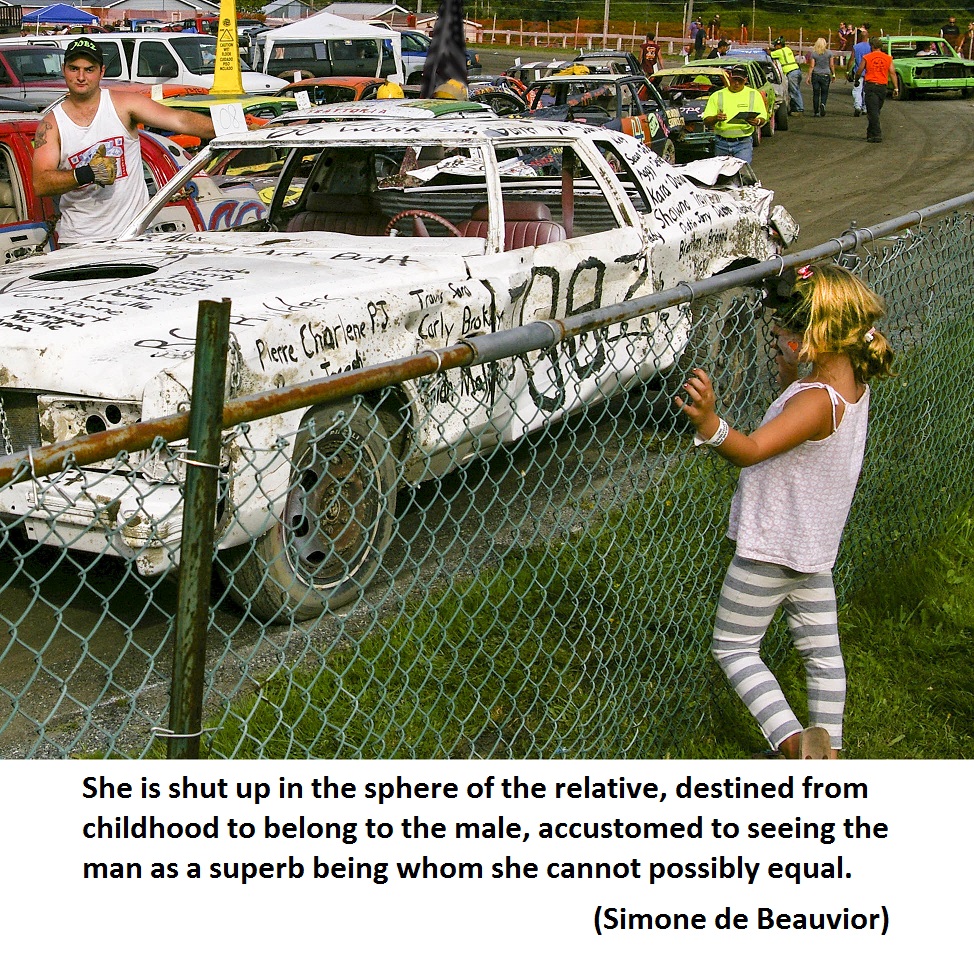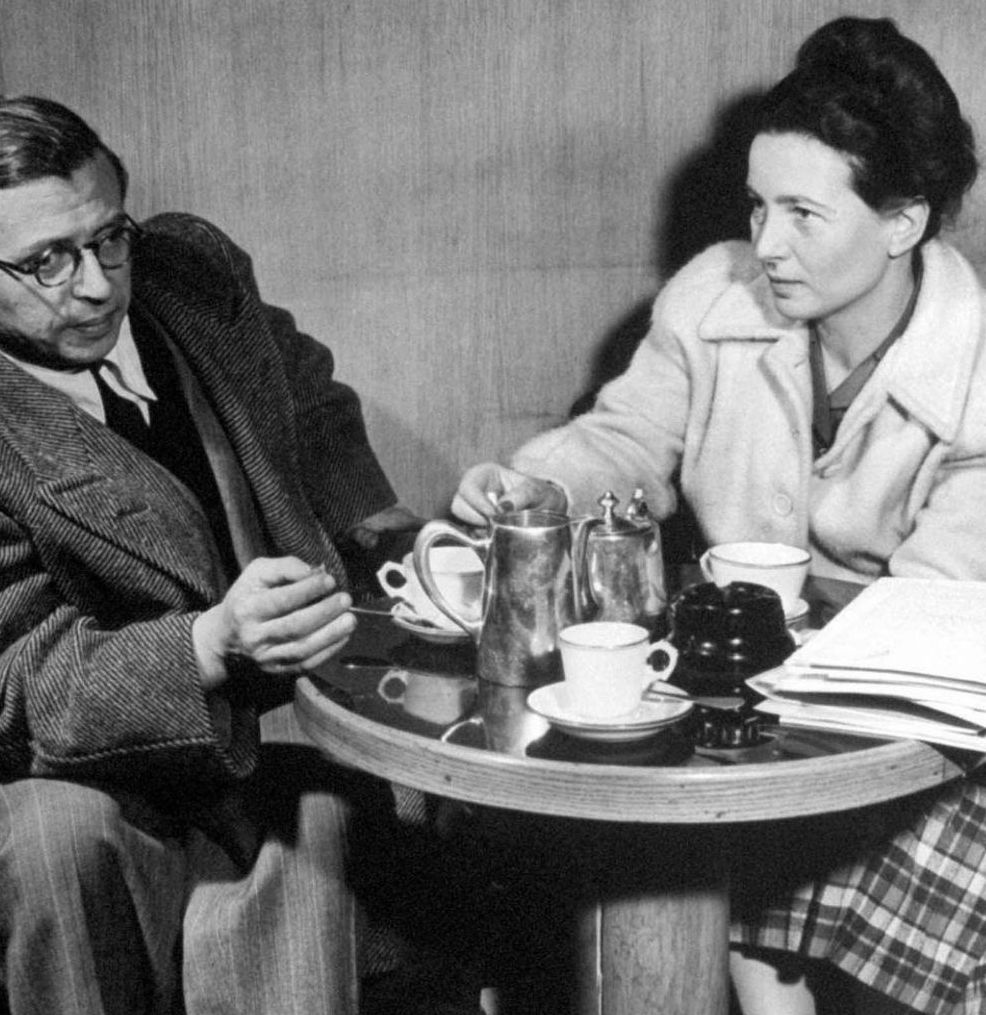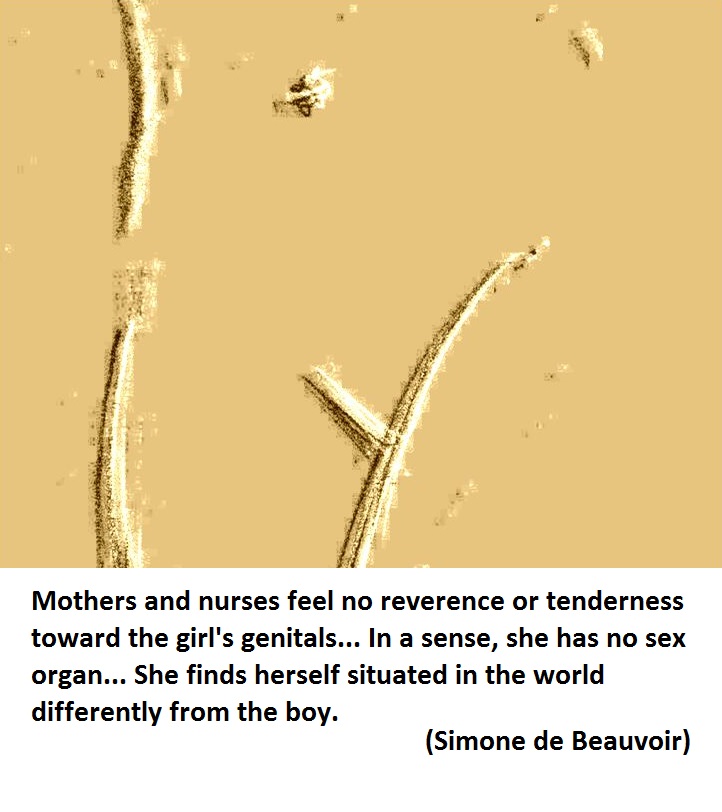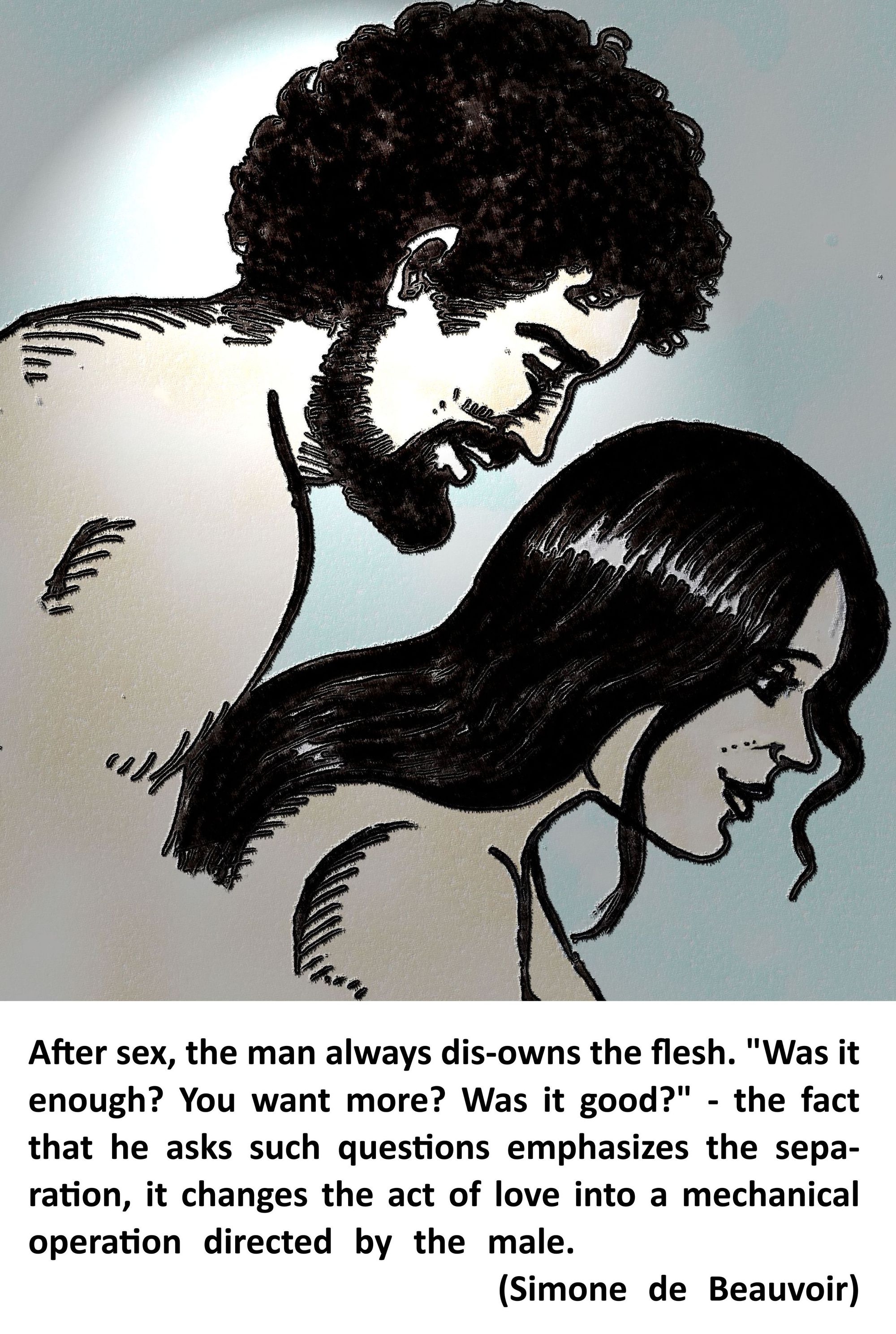|
Woman’s way of loving
 Simone de Beauvoir (1908-1986) was a French existentialist philosopher, writer, and political activist, and was one of the first women to study at the Sorbonne. During her studies she met Jean-Paul Sartre, and the two became life-long friends, intellectual companions, as well as lovers who maintained an open erotic relationship, sometimes in trio with a third woman. She wrote many novels and essays, and was also involved in the French women’s liberation movement. She died of pneumonia at the age of 78, and was buried next to Sartre in Paris. Simone de Beauvoir (1908-1986) was a French existentialist philosopher, writer, and political activist, and was one of the first women to study at the Sorbonne. During her studies she met Jean-Paul Sartre, and the two became life-long friends, intellectual companions, as well as lovers who maintained an open erotic relationship, sometimes in trio with a third woman. She wrote many novels and essays, and was also involved in the French women’s liberation movement. She died of pneumonia at the age of 78, and was buried next to Sartre in Paris.
The following text is adapted from de Beauvoir’s famous book The Second Sex (1949). In this book she argues that woman has always been regarded as an Other: Man is viewed as the “norm,” the default human being, while woman is defined relative to him, as “different,” as a deviation from man.
According to the existential philosophy of De Beauvoir and Sartre, an individual is a subject who is free to “transcend” himself or herself, in other words to go beyond the facts (biological or other) and determine goals, values, self-understandings, meanings. Woman, no less than man, is a free subject capable of self-determination, or transcendence, but society pressures her to enter the role of an object without transcendence of her own. Society tells her, already from childhood, that she is inferior to man, it denies from her equal economic freedom, it subjects her to maternal slavery, etc. She is therefore raised not as a self-determining subject, but as an addendum to man, who needs man for her salvation.
As a result, de Beauvoir argues, woman’s way of loving is also different.
FROM CHAPTER 23: THE WOMAN IN LOVE
The word “love” does not have the same meaning for both sexes, and this is one reason for the serious misunderstanding that divides them.
[…]
Men, in their most violent ecstasies, never abandon themselves completely. Even on their knees before their mistress, they still want to possess her. In the very passion of their lives they remain autonomous subjects; the beloved woman is, for them, only one value among others. They wish to integrate her into their existence, and not to spend their existence entirely on her. For woman, on the contrary, to love is to give up everything for the benefit of a master. […]
 This difference between men’s and women’s love has nothing to do with laws of nature. It is the difference in their situation that is reflected in their different conceptions of love. The individual who is a subject, who is himself, if he has the courageous inclination towards transcendence, tries to deal with the world; he is ambitious, he acts. But an inessential creature cannot sense the absolute at the heart of her subjectivity; a being doomed to immanence cannot find self-realization in actions. She is shut up in the sphere of the relative, destined from childhood to belong to the male, accustomed to seeing the man as a superior being whom she cannot possibly equal. And if she has not repressed her claim to be human, she will dream of transcending herself toward one of these superior beings, of uniting herself with the autonomous subject. There is no other way for her than to loose herself, body and soul, in the person who represented for her the absolute, the essential. Since she is anyway doomed to dependence, she will prefer to serve a god rather than obey tyrants – parents, husband or protector. She chooses to enslave herself so eagerly, that it will seem to her the expression of her liberty. […] She will humble herself to nothingness before him. Love becomes for her a religion. This difference between men’s and women’s love has nothing to do with laws of nature. It is the difference in their situation that is reflected in their different conceptions of love. The individual who is a subject, who is himself, if he has the courageous inclination towards transcendence, tries to deal with the world; he is ambitious, he acts. But an inessential creature cannot sense the absolute at the heart of her subjectivity; a being doomed to immanence cannot find self-realization in actions. She is shut up in the sphere of the relative, destined from childhood to belong to the male, accustomed to seeing the man as a superior being whom she cannot possibly equal. And if she has not repressed her claim to be human, she will dream of transcending herself toward one of these superior beings, of uniting herself with the autonomous subject. There is no other way for her than to loose herself, body and soul, in the person who represented for her the absolute, the essential. Since she is anyway doomed to dependence, she will prefer to serve a god rather than obey tyrants – parents, husband or protector. She chooses to enslave herself so eagerly, that it will seem to her the expression of her liberty. […] She will humble herself to nothingness before him. Love becomes for her a religion.
[…]
The supreme happiness of the woman in love is to be recognized by the loved man as a part of himself. When he says “we,” she is associated and identified with him, she shares his prestige and reigns with him over the rest of the world. […] She feels elevated to a place at the right side of God. It doesn’t matter that she is only in the second place, as long as she has HER place, forever, in a wonderfully ordered world. As long as she loves and is loved by him, and is necessary to him, she feels that she is fully justified: she knows peace and happiness.
[…]
 A fallen god is not a man; he is a fraud. The lover has no other alternative than to prove that he really is this adored king – or to confess that he is a fake. If he is no longer adored, he must be trampled on. Because of the glory with which she has given to her beloved, the woman in love forbids him any weakness. She is disappointed and annoyed if he does not match the image which she has put on him. If he gets tired or careless, if he gets hungry or thirsty at the wrong time, if he makes a mistake or contradicts himself, she asserts that he is “not himself” and she complains about it. A fallen god is not a man; he is a fraud. The lover has no other alternative than to prove that he really is this adored king – or to confess that he is a fake. If he is no longer adored, he must be trampled on. Because of the glory with which she has given to her beloved, the woman in love forbids him any weakness. She is disappointed and annoyed if he does not match the image which she has put on him. If he gets tired or careless, if he gets hungry or thirsty at the wrong time, if he makes a mistake or contradicts himself, she asserts that he is “not himself” and she complains about it.
[…]
Authentic love should be based on the mutual recognition of two free beings. The lovers would then experience themselves both as a self and as other. Neither of them would give up transcendence, neither would be mutilated. Together they would determine values and aims in the world.
[…]
On the day when it will be possible for woman to love not in her weakness but in her strength, not to escape herself but to find herself, not to lower herself but to assert herself – on that day love will become for her, like for man, a source of life and not of mortal danger. In the meantime, love represents the curse that lies heavily on the woman who is confined to the feminine universe, a woman mutilated, insufficient to herself.
|



 A fallen god is not a man; he is a fraud. The lover has no other alternative than to prove that he really is this adored king – or to confess that he is a fake. If he is no longer adored, he must be trampled on. Because of the glory with which she has given to her beloved, the woman in love forbids him any weakness. She is disappointed and annoyed if he does not match the image which she has put on him. If he gets tired or careless, if he gets hungry or thirsty at the wrong time, if he makes a mistake or contradicts himself, she asserts that he is “not himself” and she complains about it.
A fallen god is not a man; he is a fraud. The lover has no other alternative than to prove that he really is this adored king – or to confess that he is a fake. If he is no longer adored, he must be trampled on. Because of the glory with which she has given to her beloved, the woman in love forbids him any weakness. She is disappointed and annoyed if he does not match the image which she has put on him. If he gets tired or careless, if he gets hungry or thirsty at the wrong time, if he makes a mistake or contradicts himself, she asserts that he is “not himself” and she complains about it. 

 This explains the fact that the moment when the two bodies separate is almost always distressing for the woman. After coition, the man always dis-owns the flesh, regardless of whether he feels happy or depressed, the victim of nature or the conqueror of woman. He becomes once more an honest body. He wants to sleep, take a bath, smoke a cigarette, go out for fresh air. The woman wants to prolong the bodily contact […] “Was it enough? You want more? Was it good?” – the fact that he asks such questions emphasizes the separation, it changes the act of love into a mechanical operation directed by the male. And that is, indeed, why he asks them. He really seeks domination much more than fusion and mutuality.
This explains the fact that the moment when the two bodies separate is almost always distressing for the woman. After coition, the man always dis-owns the flesh, regardless of whether he feels happy or depressed, the victim of nature or the conqueror of woman. He becomes once more an honest body. He wants to sleep, take a bath, smoke a cigarette, go out for fresh air. The woman wants to prolong the bodily contact […] “Was it enough? You want more? Was it good?” – the fact that he asks such questions emphasizes the separation, it changes the act of love into a mechanical operation directed by the male. And that is, indeed, why he asks them. He really seeks domination much more than fusion and mutuality.